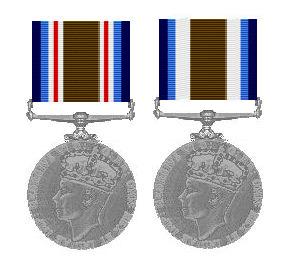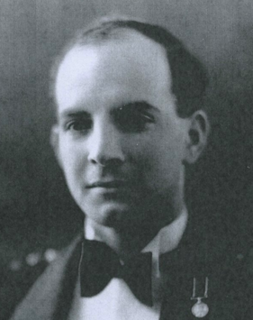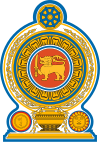
The Queen's Gallantry Medal (QGM) is a United Kingdom decoration awarded for exemplary acts of bravery by civilians, and by members of the Armed Forces "not in the face of the enemy", where the services were not so outstanding as to merit the George Cross or the George Medal, but above the level required for the Queen's Commendation for Bravery.

The Sri Lankan Armed Forces award medals and their associated ribbon bars in recognition of various levels of service, personal accomplishments and commemorative events while a regular- or volunteer serviceperson is a member of the Sri Lanka Army, Sri Lanka Navy and the Sri Lanka Air Force. Together with military badges, such awards are a means to outwardly display the highlights of a serviceperson's career.

The Parama Weera Vibhushanaya is the highest decoration awarded by the Sri Lankan military, equivalent to the British Victoria Cross and the United States Medal of Honor. The medal is awarded to all ranks of the tri services, to both regular- and volunteer forces, in recognition of:
...individual acts of gallantry and conspicuous bravery of a non-military nature of the most exceptional order performed voluntarily with no regard to his own life and security with the objective of saving or safeguarding the life or lives of a person or personnel imperiled by death or for a meritorious act or a series of acts of a humane nature of an exceptional order displayed in saving life from drowning, fire and rescue operations in mines, floods and similar calamities under circumstances of grave bodily injury or great danger to the life of the rescuer...

The Weerodara Vibhushanaya is the second-highest decoration awarded by the Military of Sri Lanka awarded for:
...individual acts of gallantry and conspicuous bravery of a non-military nature of the most exceptional order performed voluntarily with no regard to his own life and security with the objective of saving or safeguarding the life or lives of a person or personnel imperiled by death or for a meritorious act or a series of acts of a humane nature of an exceptional order displayed in saving life from drowning, fire and rescue operations in mines, floods and similar calamities under circumstances of grave bodily injury or great danger to the life of the rescuer...

The Weera Wickrama Vibhushanaya is the third-highest military decoration awarded by the Military of Sri Lanka for:
...individual acts of gallantry and conspicuous bravery of a military nature of a high order in the face of the enemy performed voluntarily whilst on active service without regard for his own security with the objective of safeguarding thereby the lives of his comrades or facilitating the operational aim of his force or for a meritorious act or a series of acts of a humane nature of a high order displayed in saving life from drowning, fire and rescue operations in mines, floods and similar calamities under circumstances of bodily injury or danger to the life of the rescuer...

The Rana Wickrama Padakkama is awarded to Sri Lankan military service personnel serving in both the regular- and volunteer forces as a reward for:
...individual or associated acts of bravery in the face of the enemy and performed voluntarily...
The Queen's Fire Service Medal is awarded to members of the fire services in the United Kingdom and Commonwealth of Nations for distinguished service or gallantry. It was introduced on 19 May 1954 when it replaced the King's Fire Service Medal. Recipients may use the post-nominal letters “QFSM.”
The Sri Lankan national honours system is a fully indigenous honours system of titles, decorations and medals which are awarded to recognize achievements of, or service by, Sri Lankans or others in connection with Sri Lanka. Until 1972, the British honours system was in place in Ceylon along with several indigenous titles, however since 1956 no nominations were made for these honours and were automatically discontinued after Sri Lanka became a republic. Since 1981 a uniquely Sri Lankan system of National Honours have been introduced. These awards are titles that can be used by the recipients.

The Riviresa Campaign Services Medal was a campaign medal presented to all ranks of the regular and volunteer forces of the Military of Sri Lanka, Sri Lanka Police, as well as civilians that were involved in planning or assisting Operation Riviresa, one of the most notable successes of the Sri Lankan forces during Eelam War III.
The Overseas Territories Police Medal (OTPM), known as the Colonial Police Medal (CPM) until April 2012, is a medal awarded for gallantry or distinguished service to police officers in British Overseas Territories and formerly in Crown Colonies and British Dependent Territories. Officers from these areas can also be awarded the Queen's Police Medal, which is considered to be a higher award. The CPM was first awarded in 1938.
The Sri Lanka Police Weeratha Padakkama is awarded to police officers in Sri Lanka for gallantry or brave performance of duty. It is awarded by the Inspector General of Police (IGP). The medal replaced the Ceylon Police Medal for Gallantry which was awarded until Ceylon became a Republic in 1972.

The Ceylon Police Medal was awarded to police officers of the Ceylon Police Force for gallantry or meritorious service. The medal was replaced by the Sri Lanka Police Weeratha Padakkama for gallantry and Sri Lanka Police Vishishta Seva Padakkama for meritorious service when Ceylon became a Republic in 1972.
General Rohan De Silva Daluwatte, WWV, RWP, RSP, VSV, USP was a general of the Sri Lanka Army. He served as Commander of the Sri Lanka Army and Chief of the Defence Staff. Following his retirement from the army, he served as Sri Lankan Ambassador to Brazil among other appointments.
G. S. Jayanath PWV, CR, was a Major in the Sri Lanka Army and a member of the army's elite Commando Regiment. He posthumously received the Parama Weera Vibhushanaya, the country's highest military award for gallantry, for his actions during Operation Jayasikurui in the Sri Lankan Civil War. Jayanath is the only Commando to receive this decoration.
Wing Commander Tyron D. S. Silvapulle, PWV, RWP. RWP was a Sri Lankan pilot. He distinguished himself as a capable helicopter pilot in the Sri Lanka Air Force during the Sri Lankan Civil War. Silvapulle was killed in action in northern Sri Lanka, and posthumously awarded the Parama Weera Vibhushanaya, the country's highest military award for gallantry. To date, he is the only recipient of the award from the Sri Lanka Air Force.
Jayantha Wickramarathne was the 31st Sri Lankan Inspector-General of Police.

John Percival Morton CMG OBE (1911–1985), also known as Jack Morton, was Assistant Undersecretary of State at the Ministry of Defence between 1968 and 1971. He also had a distinguished career in the Indian Police where he was awarded the Indian Police Medal twice for gallantry and the Indian Bar (1940). He was made OBE in 1946 and CMG in 1965.
Police Medal may refer to:












